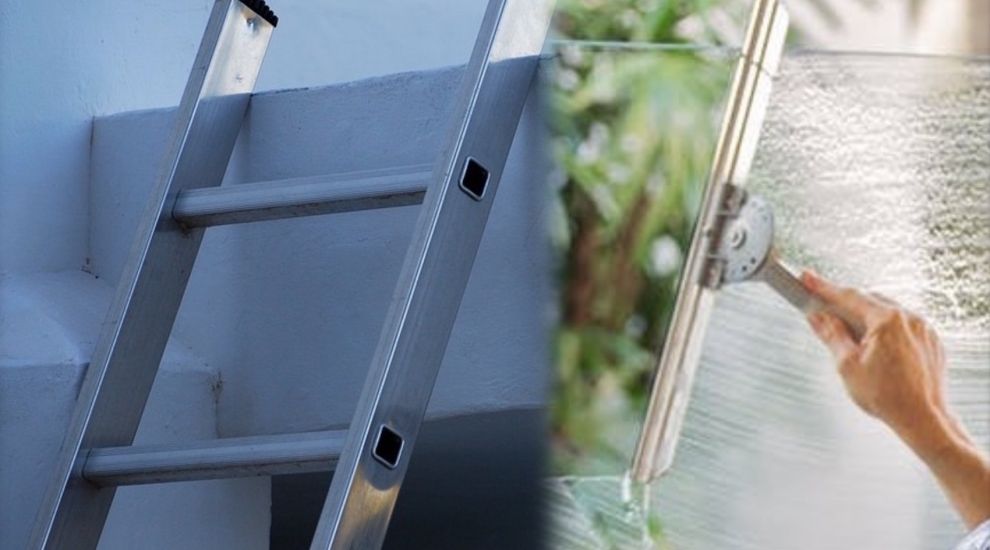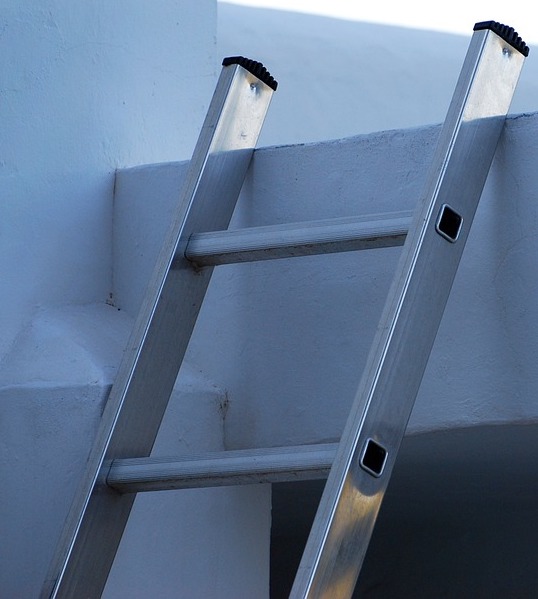

A window cleaner who fractured his wrist and back after falling off a ladder has won his claim that his employer breached its duty.
However, though Joäo Carlos da Silva Conceiçäo won his case against Sliva Cleaning Services Limited, the court noted Mr Conceiçäo's actions had also contributed to the incident.
Mr Conceiçäo told the Royal Court that the accident happened while working on a property in St. Ouen to clean first-floor windows. As he climbed the ladder, he said he kept his smop - a spongy roller with a short handle used to wet and wash the windows - and blade in his left hand, as he was afraid that putting them in the pouches on his belt would lead them to fall and hurt somebody.
After descending three rungs of the ladder, his foot slipped, and as his left hand was full, he said he could only hold on to the ladder with his right hand and could not stop himself from falling. He suffered injuries including fractures of his left wrist, one of his vertebrae and his right ankle.
He said that at his previous job, he had been provided with a holster to store the equipment, where he would place his blade and smop, but that he had not been provided with one at Silva, only being given the belt with pouches.

Pictured: Mr Conceiçäo was cleaning the first floor window of a property in St. Ouen when his accident happened.
Mr Conceiçäo also said that he had not been given any formal training, and denied having been told about Health and Safety documents in the company van, which were written in English, a language Mr Conceiçäo said he could not read.
He did however acknowledge that owner Horacio da Silva had provided instructions and comment on situations that might be risky.
Despite these instructions though, he said that Mr da Silva had never reprimanded him for carrying the tools up the ladder in the way he did or told him to keep his hands free, despite having seen him working 20 to 30 times.
Mr da Silva disputed the claims he had not told Mr Conceiçäo about the Health and Safety documents, saying that he advised employees that copies of the Risk Assessment and the Method Statement were kept in the company van.
He further argued that he carried out ‘on the job’ training for each employee in Portuguese, involving practical demonstrations and explanations of safe working techniques.

Pictured: Expert witnesses agreed that belts with pouches were a perfectly safe way to store both smops and blades.
Mr da Silva also recalled an occasion where Mr Conceiçäo had gone up the ladder without the belt, using his own pockets for the equipment.
He said he had told Mr Conceiçäo not to use the ladder with equipment in his hand and to retrieve his belt, and that immediately following this, he had made some offensive remarks which Mr da Silva overheard. Mr Conceiçäo denied these claims.
In regard to the safety of placing items in pouches, Mr da Silva said that in his 28 years in the business, he had never had a problem with equipment falling out, giving the court a demonstration they said he was “able to undertake with consummate ease.”
Two expert witnesses both agreed that there was low risk of tools falling from a pouch and that they were a perfectly acceptable and safe method for transporting the tools up and down a ladder.
Summing up, the Court noted they had some “reservations” about both men’s evidence, having already ruled out using some of a separate witnesses’ claims due to inconsistencies.
Despite this, they said that they preferred Mr da Silva’s evidence in regards to training, finding that he had given oral advice in Portuguese about keeping hands free when using the ladder. They further referred to him as “an employer who takes his health and safety responsibilities seriously.”
They also stated that Mr Conceiçäo’s actions were “not a case of momentary inattention”, and that in deliberately not using pouches to hold equipment, he was in breach of his instruction and training. Subsequently, the court said Mr Conceiçäo’s responsibility for the accident should be assessed at 40%.

Pictured: Though the Royal Court concluded there had been a breach of duty on the employer's part, it still put 40% of the responsibility on Mr Conceiçäo for the accident.
Overall however, the court said that “Mr da Silva did witness the plaintiff using the ladder with the tools in his hand rather than in the pouch and did not take steps to put an end to this practice.”
It concluded that it found “[Silva] not to be in breach of its duty to provide adequate training, but we find it to be in breach of its duty to maintain a safe system of work by adequate monitoring and supervision so as to ensure, so far as reasonably practicable, that such system of work was implemented in practice.”
A further judgement of costs ruled that as the winning party, Mr Conceiçäo was entitled to be paid the costs of and incidental to the proceedings. Damages are yet to be assessed.
Comments
Comments on this story express the views of the commentator only, not Bailiwick Publishing. We are unable to guarantee the accuracy of any of those comments.